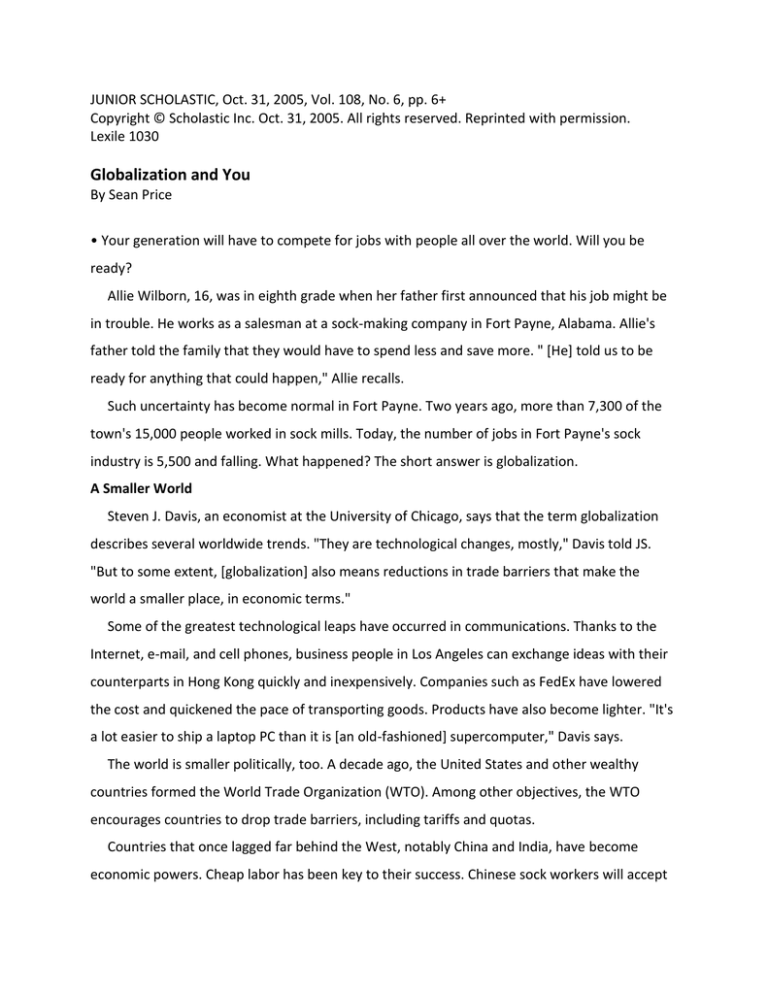
JUNIOR SCHOLASTIC, Oct. 31, 2005, Vol. 108, No. 6, pp. 6+
Copyright © Scholastic Inc. Oct. 31, 2005. All rights reserved. Reprinted with permission.
Lexile 1030
Globalization and You
By Sean Price
• Your generation will have to compete for jobs with people all over the world. Will you be
ready?
Allie Wilborn, 16, was in eighth grade when her father first announced that his job might be
in trouble. He works as a salesman at a sock-making company in Fort Payne, Alabama. Allie's
father told the family that they would have to spend less and save more. " [He] told us to be
ready for anything that could happen," Allie recalls.
Such uncertainty has become normal in Fort Payne. Two years ago, more than 7,300 of the
town's 15,000 people worked in sock mills. Today, the number of jobs in Fort Payne's sock
industry is 5,500 and falling. What happened? The short answer is globalization.
A Smaller World
Steven J. Davis, an economist at the University of Chicago, says that the term globalization
describes several worldwide trends. "They are technological changes, mostly," Davis told JS.
"But to some extent, [globalization] also means reductions in trade barriers that make the
world a smaller place, in economic terms."
Some of the greatest technological leaps have occurred in communications. Thanks to the
Internet, e-mail, and cell phones, business people in Los Angeles can exchange ideas with their
counterparts in Hong Kong quickly and inexpensively. Companies such as FedEx have lowered
the cost and quickened the pace of transporting goods. Products have also become lighter. "It's
a lot easier to ship a laptop PC than it is [an old-fashioned] supercomputer," Davis says.
The world is smaller politically, too. A decade ago, the United States and other wealthy
countries formed the World Trade Organization (WTO). Among other objectives, the WTO
encourages countries to drop trade barriers, including tariffs and quotas.
Countries that once lagged far behind the West, notably China and India, have become
economic powers. Cheap labor has been key to their success. Chinese sock workers will accept
50 cents an hour, far below the $12 to $15 per hour that many U.S. workers expect. Such
competition is forcing Fort Payne factories to shut down or relocate overseas.
Education Means Survival
Globalization does not just challenge sock makers, says New York Times columnist Thomas L.
Friedman. It is affecting even high-tech jobs in the U.S. In his book The World Is Flat, Friedman
points out that Bangalore, India, alone has 160,000 high-tech jobs. Well-educated Indians there
earn $5,000 a year at computer call centers for such U.S. companies as Dell and International
Business Machines (IBM). The same job in the U.S. pays an average of $25,000.
Last May, IBM announced that it was cutting as many as 13,000 jobs in the U.S. and Western
Europe, while creating 14,000 in India. Robert W. Moffat, an IBM senior vice president, told The
New York Times that saving money was not the biggest issue. "It's mostly about skills," he said.
Friedman echoes Moffat's reasoning. "Compared with young Indians and Chinese," he
writes, "too many Americans have become lazy." The U.S. educational system, he adds, is
failing. High schools produce too few graduates with basic science and math skills. U.S. colleges
produce too few engineers and scientists. "In the international competition to have the biggest
and best supply of [skilled] workers," Friedman says, "America is falling behind."
Critics of outsourcing (sending jobs overseas) say that corporate greed is to blame for the
loss of jobs. Marcus Courtney, president of the Washington Alliance of Technical Workers, says
that companies like IBM want to continually lower costs for their own profits: "The winners are
the richest corporations in the world, and American workers lose."
Despite complaints from workers in Fort Payne and other U.S. cities, global competition is
here to stay. Davis says that a good education and flexibility are key to maintaining a
competitive advantage. "You have to be ready to do more than one thing in your life in terms of
work activity," he says. "Most of us will."
That is one reason why Allie Wilborn, who still worries about the loss of jobs in her
hometown, is keeping up with her studies. As Friedman observes, "In a flat world, every
individual is going to have to run a little faster if he or she wants to advance his or her standard
of living."
Not Measuring Up
A recent three-year study by an international educational organization found that 15-yearolds in the U.S. lag behind many of their peers in other countries in math and science skills.
Here are the top 5 finishers in the math and science tests, which were taken by more than 23
million students in 41 industrial countries. The U.S. ranks are shown for comparison.
Math
1. Hong Kong (China)
2. Finland
3. South Korea
4. Netherlands
5. Liechtenstein
28. United States
Science
1. Finland
2. Japan
3. Hong Kong (China)
4. South Korea
5. Liechtenstein
22. United States
• Source: Organization for Economic Cooperation and Development's Program for International
Student Assessment (PISA), 2003
• Global connections/production, distribution and consumption: .How changes in technology
and other factors are shifting economic power to countries that once lagged far behind the U S.,
particularly in the means of production and the distribution of jobs.
Quick Quiz: Use a name, word, or phrase from this list to correctly, complete each sentence.
cheap labor, computer factories, educated labor force, Finland, Germany, globalization, grain
mills, high-paying jobs, India, Internet, outsourcing, quotas, tariffs, sock mills, United States
1. In the last two years, the town of Fort Payne, Alabama, has lost thousands of jobs in its
_______________.
2. Government taxes on imports or exports are called _______________.
3. The country whose students rank number one in science test scores is _______________.
4. The term that means limited numbers or shares, as of imported products, is
_______________.
5. One key to the economic success of China and India has been their _______________.
Citation :
Price, Sean. "Globalization and You." Junior Scholastic (Vol. 108, No. 6). Oct. 31 2005: 6+. SIRS
Discoverer. Web. 27 Oct. 2014.





